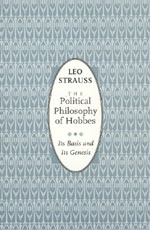The Political Philosophy of Hobbes: Its Basis and Its Genesis, trans. Elsa M. Sinclair, University of Chicago Press, 1952. Originally published as The Political Philosophy of Hobbes: Its Basis and Its Genesis, Oxford, at the Clarendon Press, 1936.
Excerpt:
Hobbes’s political philosophy is the first peculiarly modern attempt to give a coherent and exhaustive answer to the question of man’s right life, which is at the same time the question of the right order of society. There is perhaps no element of Hobbes’s teaching which cannot be traced back to one or other of his predecessors; and it may be that one or other of them was in some respects less bound by tradition than was Hobbes. But such elements as had emerged separately before his time find their specifically modern unity only in Hobbes; and none of Hobbes’s forerunners attempted that definite break with tradition in its entirety which the modern answer to the question of man’s right life implies. Hobbes was the first who felt the necessity of seeking, and succeeded in finding, a nuova scienza of man and State. On this new doctrine all later moral and political thought is expressly or tacitly based. To indicate its political importance one might stress the fact that the ideal of civilization in its modern form, the ideal both of the bourgeois-capitalist development and of the socialist movement, was founded and expounded by Hobbes with a depth, clarity, and sincerity never rivaled before or since. To give an indication of its philosophical bearing one might point out that the moral philosophy, not merely of eighteenth-century rationalism, but also of Rousseau, Kant, and Hegel, would not have been possible without Hobbes’s work. But above all, as a fundamental answer to the question of man’s right life, Hobbes political philosophy is of such supreme importance not only for political philosophy as such, i.e. for one branch of knowledge among others, but for modern philosophy altogether, if the discussion and elucidation of the ideal of life is indeed the primary and decisive task of philosophy.
Online:
Google Books
Amazon

